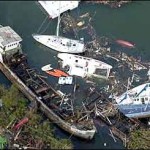~graham reeder
While climate change negotiations have stagnated over time due to a lack of political will, many are arguing that the diplomatic approach that the UNFCCC has taken to arriving at agreement—one where treaties and agreements are built out of what parties are willing to contribute or concede—does not do justice to the urgency and potency of the issues at hand. Some lawyers are arguing that a human rights based approach could benefit the process in that it gives the international community increased power to intervene and combat the defence of state’s sovereign rights to act as they wish within their own borders. While the rights based approach is multi-faceted and impact a number of different elements of UNFCCC negotiations, one element of human rights law stands out in terms of informing current climate negotiations: that of addressing liability for impacts, loss, and damage due to climate change.
There are a number of international treaties that elaborate human rights that are threaned by climate change, these rights include the right to life, the right to an adequate standard of living, the right to housing, the right to food, the right to health, and the right to self-determination; the treaties include the International Covenant on Economic, Social, and Cultural Rights (ICESCR), the Covenant on the Elimination of All Forms of Discrimination against Women (CEDAW) and the International Convention on the Protection of the Rights of All Migrant Workers and Members of Their Families (MWC). Many of the rights guaranteed in these treaties, particularly the right to life, are not to be interpreted in a restrictive manner; they require positive measures to be taken by states to protect them. The Human Rights Committee noted that states are responsible for preventing acts of mass violence causing arbitrary loss of life, which some have argued could include climate change. Preventing and minimising loss of life from natural disasters and other climate related events is an obligation of states who are parties to the aforementioned conventions.
Despite obligations to support adaptation efforts in developing countries through cooperation, finance, and technology transfer outlined in the convention, adaptation finance and support has been systematically under-supported by developed countries. This indicates that the vast majority of the burden of adaptation will need to fall on national governments, including disaster risk reduction and harm reduction for changes that will take place despite adaptation efforts. Where countries do not have the resources to take sufficient measures to protect the right to life and other human rights in these cases, significant issues of liability and obligations arise. These human rights duties, when interpreted in relation to increased natural disasters, present a unique problematic for developing countries who lack the capacity to reduce and manage risk and damage from natural disasters, particularly when they are not those responsible for increasing the risk of those natural disasters in the first place. Where the European Court of Human Rights can argue that Russia was responsible for taking measures to reduce risk in the case of a mudslide (as they did in 2008), it may be unclear who should be held responsible for reducing the risk of a hurricane hitting Haiti.
Because of this tension, Nauru tabled a proposal in 1991 to develop a mechanism that would insure against loss and damage caused by climate change. This proposal saw little progress until the 2010 Cancun Accords that begun a work programme to address loss and damage from the adverse effects of climate change. The Alliance of Small Island States, the Least Developed Countries, and the G77 have all called for establishing of an international mechanism to address all elements of loss and damage from climate change through risk management, insurance, compensation, and rehabilitation. This international mechanism would address some of the broader international legal principles at play in the dynamic of human rights and climate change, such as the polluter pays principle, common but differentiated responsibilities and respective capabilities, the obligation not to cause environmental harm, and state sovereignty. As Sri Lankan President Mahinda Rajapaksa pointed out, “in an era of increasing concern for human rights, we address the consequences for the poor of pollution, and ensure mechanisms for compensation when basic rights, for life, for health, for development, are violated.”

In 2004 Hurricane Ivan killed at least 12 people in Grenada and cost the country 200% of its GDP
As the UNFCCC considers creating a mechanism to address loss and damage at COP 18 in Doha and beyond, i
t might consider the existing human rights frameworks that may kick in without effective implementation of such a mechanism. That is to say that those parties, particularly those developed country parties that have been identified as being obstructive in the process (Canada, the United States), might consider the potential for being accused in court of violating human rights. Argentina has already noted in a submission to the FCCC on post-2012 negotiations that contributions from developing countries will necessarily depend on “striking the balance between our responsibility to our citizens—ensuring they have access to minimum standards of security, human rights, and social benefits, such as food, health, education, shelter, and opportunity for self-development—and the means available to implement mitigation activities.” Developed countries have a duty to ensure that private actors do not directly violate human rights. This means that they must regulate those actors to prevent them from acting contrary to international law. When states fail to do so, as is so often the case, they place themselves in a position to be held liable for human rights violations. Though this liability may not result in successful trial in human rights cases, it does outline the obligations of developed countries to support a mechanism that addresses loss and damage.



